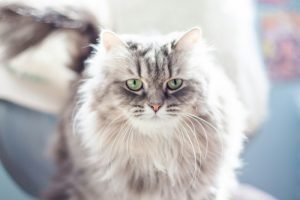- The Lifespan of Osteoclasts: How Long Do They Live?
- What is Monkfish average lifespan?
- What is Amberjack average lifespan?
- What is Sturgeon average lifespan?
- What is Barramundi average lifespan?
- What is Wahoo average lifespan?
- What is Shark average lifespan?
- What is Redfish average lifespan?
- What is Marlin average lifespan?
- What is Pompano average lifespan?
- What is Rainbow Trout average lifespan?
- What is Swordfish average lifespan?
- What is Anchovy average lifespan?
- What is Grouper average lifespan?
- What is Halibut average lifespan?
- What is Carp average lifespan?
- What is Pike average lifespan?
- What is Flounder average lifespan?
- What is Tilapia average lifespan?
- What is Sardine average lifespan?
The Best Food for Siberian Cats: What They Love to Eat

Siberian cats, known for their luxurious fur and playful nature, have unique dietary needs that can significantly impact their health and well-being. Selecting the right food for these majestic felines is essential to keep them healthy, happy, and full of energy. This article explores what Siberian cats love to eat, the best food options, and how to cater to their specific nutritional needs.
Understanding Siberian Cats’ Nutritional Needs
Siberian cats are large, robust, and active, which means they have specific dietary requirements. A well-balanced diet is crucial to support their high energy levels and maintain their striking coat.
Key Nutrients for Siberian Cats:
- Protein – Essential for muscle growth and repair. Siberian cats need a diet rich in animal-based proteins. Look for foods where chicken, turkey, or fish are the primary ingredients.
- Fat – Provides energy and helps maintain a healthy coat. Aim for foods with moderate fat content, around 15-20%.
- Vitamins and Minerals – Important for overall health. Ensure the food includes essential vitamins like A and D, and minerals such as calcium and phosphorus.
- Water – Hydration is key. Wet food can help with water intake, but always provide fresh water.

The Best Food for Siberian Cats
When choosing food for Siberian cats, quality is paramount. Here are some top recommendations:
- High-Quality Commercial Cat Food:
- Dry Food: Convenient and helps with dental health. Look for brands like Royal Canin Siberian or Hill’s Science Diet, which offer formulas specifically designed for Siberian cats.
- Wet Food: Often more palatable and helps with hydration. Brands such as Wellness CORE or Blue Buffalo Wilderness provide high-protein options.
- Special Dietary Considerations:
- If your Siberian cat has food allergies or sensitivities, opt for hypoallergenic or limited-ingredient diets.
- If your cat is overweight, choose a low-calorie formula and monitor portion sizes.
What Do Siberian Cats Like to Eat
Siberian cats are known for their diverse tastes, but they typically gravitate towards rich, meaty flavors. They commonly prefer foods featuring chicken, fish, and turkey, as these ingredients tend to be more appealing to them. Additionally, many Siberian cats enjoy a combination of wet and dry food, which offers them a pleasing mix of textures and variety in their diet.
How Often Do Siberian Kittens Need to Be Fed
Kittens have different feeding needs compared to adult Siberian cats. Young kittens require more frequent feedings and a higher calorie content to support their rapid growth. It is recommended to feed them 3 to 4 times a day until they reach about six months of age. In contrast, adult Siberian cats need fewer calories and can be fed 2 to 3 times a day. Despite this reduction in frequency, they still require a balanced diet to maintain their health and energy levels.

What Human Food Can Siberian Cats Eat
While commercial cat food should be the primary diet for your Siberian cat, some human foods can be safe and enjoyable in moderation. For instance, plain, cooked chicken or turkey can serve as a good protein treat, and cooked eggs, which are rich in protein, can be offered in small amounts.
However, it’s crucial to avoid certain foods that can be harmful to cats. Onions and garlic are toxic to cats and should never be included in their diet.
Also, some cats don’t like dairy products because they can have problems with their digestion.
Tips for Feeding Your Siberian Cat
Maintaining a consistent feeding routine and keeping a close eye on your Siberian cat’s health are crucial for their well-being. Establishing a feeding schedule by offering meals at the same times each day helps create a reliable routine that can improve their overall stability.
It’s also important to regularly monitor your cat’s weight and health, adjusting their diet as necessary, particularly if you notice any changes in weight.
It is also important for your cat to have access to fresh water at all times. Incorporating wet food into their diet can further help increase their water intake, supporting their overall health.

Choosing the right food for your Siberian cat involves understanding their unique nutritional needs and preferences. By providing high-quality, balanced meals and considering their specific dietary requirements, you can ensure your Siberian cat stays healthy and happy. Regular check-ups with your veterinarian will help tailor their diet to their evolving needs.



